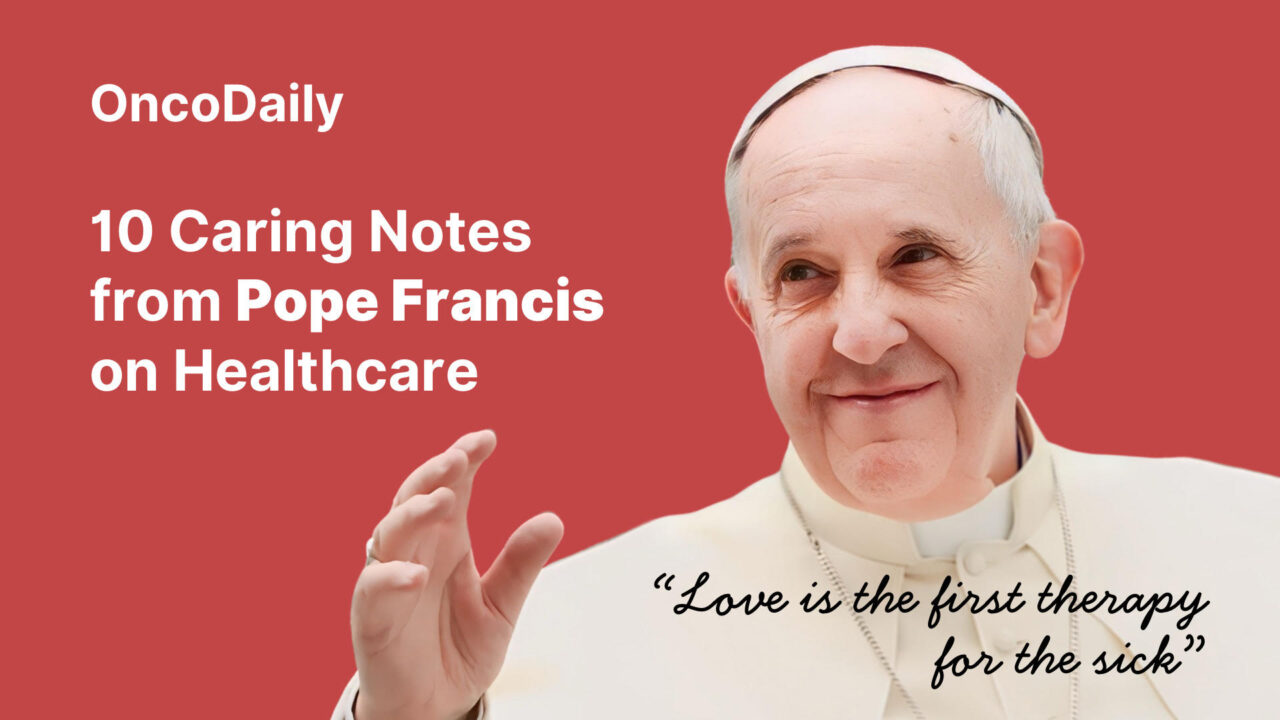Pope Francis died on Easter Monday, April 21, 2025, at the age of 88 at his residence in the Vatican’s Casa Santa Marta. The cause of death was a stroke followed by irreversible cardiocirculatory collapse, confirmed by Vatican medical officials. He had been hospitalized earlier that year for bronchitis and bilateral pneumonia and had a history of respiratory and cardiovascular issues. Cardinal Kevin Farrell, Camerlengo of the Holy Roman Church, officially announced his death. Pope Francis’s body was transferred to St. Peter’s Basilica for public veneration starting April 23, with his funeral Mass scheduled for April 26. The papal conclave to elect his successor is expected between May 6 and 12, 2025
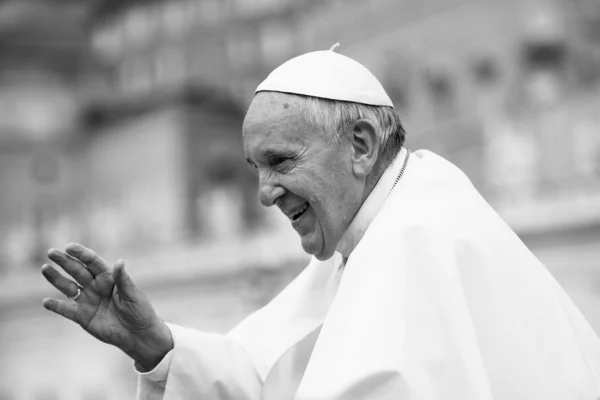
Photo: Depositphotos
Pope Francis has been a consistent voice in advocating for dignity, equity, and compassion in healthcare. Through his speeches, messages, and interviews, he emphasizes that healthcare is not a privilege but a fundamental right that must be accessible to all. The following ten statements reflect his holistic and humane vision for medicine and care.
1. “Health care is not a luxury, it is a right that belongs to everyone.”
January 16, 2023 – Meeting with the Italian National Federation of Radiographers and Technical Medical ProfessionalsIn this address, Pope Francis affirmed that healthcare should be universally accessible, calling on governments to ensure it reaches the most vulnerable. He also praised medical professionals for their service during the COVID-19 crisis. Source: NCR Online, Vatican News.
2. “The sickbed can become a holy place, where charity burns away indifference and gratitude grows.”
April 6, 2025 – Reflection reported by LiCAS.news Pope Francis reflected on illness as a space for profound human connection, urging healthcare providers to recognize each patient encounter as sacred and meaningful. Source: LiCAS.news.
3. “Putting the patient before the disease is essential in every field of medicine; it is fundamental for a treatment that is truly comprehensive, truly human.”
October 18, 2021 – Vatican meeting with Biomedical Campus of Rome Pope Francis emphasized the importance of patient-centered care that treats individuals with empathy and sees beyond medical conditions. Source: Exaudi.
4. “The first form of care needed in any illness is compassionate and loving closeness.”
February 7, 2024 – Message reported by Melbourne Catholic this statement underlines the emotional and relational dimensions of healing, prioritizing empathy alongside clinical care. Source: Melbourne Catholic.
5. “The thing the Church needs most today is the ability to heal wounds and to warm the hearts of the faithful.”
September 21, 2013 – Interview with La Civiltà Cattolica Comparing the Church to a “field hospital,” Pope Francis advocated for mercy and healing over institutional rigidity. Source: Vatican.va.
6. “We must never forget that health is a fundamental human right, and that access to health care is a duty of society.”
June 4, 2022 – Address to Italian healthcare association Federsanità He urged systemic reforms that eliminate healthcare inequality and uphold justice through universal, free healthcare access. Source: Catholic Review.
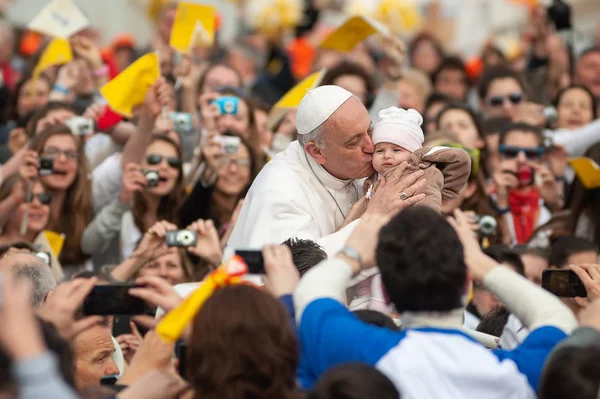
Photo:Depositphotos
7. “The pandemic has shown us that health care is a universal right, and that no one should be excluded.”
January 16, 2023 – Same meeting as quote #1The Pope reflected on the lessons of COVID-19, emphasizing the urgent need for inclusive health systems. Source: NCR Online.
8. “Doctors, nurses, and all health workers are true heroes, who deserve our gratitude and support.”
May 12, 2020 – International Nurses DayPope Francis honored the courage of healthcare workers and praised their role as “guardians of life” during the pandemic.Source: Vatican News.
9. “Love is the first therapy for the sick.”
January 16, 2024 – Message for World Day of the SickHe underscored the transformative power of love, suggesting that genuine care often begins with emotional support and human connection. Source: USCCB.
10. “We cannot allow a culture that discards the sick and the elderly, treating them as burdens.”
June 15, 2022 – General Audience at St. Peter’s SquareFrancis condemned the “throwaway culture” that marginalizes vulnerable populations and urged compassionate inclusion. Source: Catholic Leader.
You Can Also Watch All about Pope Francis’ Visit to a Hospital for Babies.
Did You Know Pope Francis Was Trained as a Chemist Before Entering the Seminary?
Pope Francis, before entering the seminary, studied chemistry and worked as a chemist, having graduated from a technical secondary school (Escuela Técnica Industrial No. 12) with a diploma equivalent to a chemical technician certification. Although some reports mistakenly claim he earned a master’s degree in chemistry, he never completed a university degree in the subject. His background in chemistry influenced his analytical approach and respect for the scientific method, which aligns with the Jesuit tradition of integrating science and faith. This scientific foundation has contributed to his engagement with contemporary issues like climate change and ethical scientific research during his papacy.
Where Did Pope Francis Wish to Be Buried—and Why So Simply?
Pope Francis requested a simple funeral and burial, as detailed in his final will dated June 29, 2022. He wished to be buried in a simple underground tomb “in the ground, without particular decoration,” with only the inscription “Franciscus” marking his grave. Unlike many previous popes, he asked not to be buried in St. Peter’s Basilica but in the Papal Basilica of St. Mary Major in Rome, a church he frequently visited for prayer at the beginning and end of his apostolic journeys. His tomb is to be located in a niche between the Pauline Chapel and the Sforza Chapel within the basilica.
The costs of his burial are covered by a benefactor he arranged. He also expressed a desire for his funeral to be modest, avoiding elaborate ceremonies such as the use of a catafalque or multiple coffins, reflecting his preference for humility and simplicity. His body was displayed for public veneration at St. Peter’s Basilica before being transferred for burial.
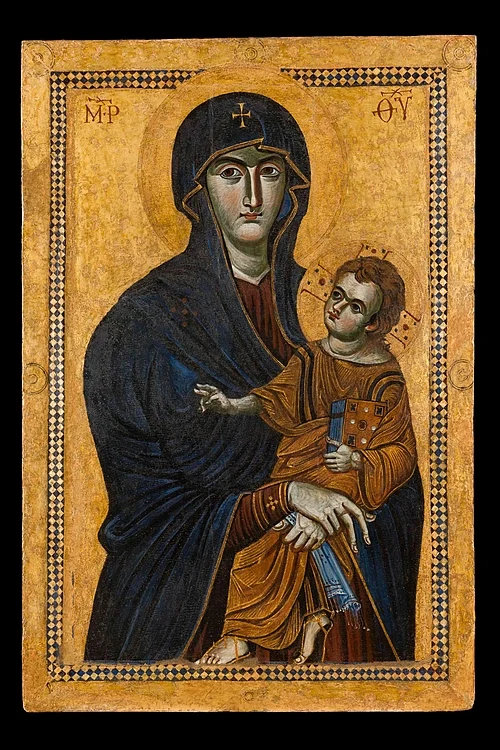
Salus Populi Romani (English: Protectress/Salvific Health of the Roman People) is one of Pope Francis’s most beloved icons for prayer. Housed in the Basilica of St. Mary Major in Rome, this revered image of the Virgin Mary holds deep spiritual significance for the Pope, who often visited it before and after his apostolic journeys to pray for protection and guidance.
You Can Also Read In Memory of Jimmy Carter and His Battle with Melanoma by Oncodaily

Written by Aharon Tsaturyan MD
FAQ
What is the Catholic Church’s teaching on healthcare as a right?
The Catholic Church teaches that healthcare is a fundamental human right, rooted in the dignity of every person created in the image of God. This right is not just individual but social, emphasizing the community’s responsibility to ensure access for all, especially the vulnerable.
How much does the Catholic Church contribute to global healthcare?
The Catholic Church provides about 25% of all healthcare services worldwide, with this figure rising to 40–70% in parts of Sub-Saharan Africa. In many regions, Catholic facilities are the only providers of healthcare, especially for the poor and marginalized.
How does the Vatican oversee Catholic healthcare facilities?
In 2015, Pope Francis established a Pontifical Commission to supervise and control the management of assets in Catholic healthcare facilities, particularly those run by religious congregations, following scandals in the sector. However, the commission’s visibility and ongoing activity have been questioned.
What recent initiatives has the Vatican promoted in healthcare?
The Vatican, through the Dicastery for Promoting Integral Human Development, launched a global initiative in 2021 to improve water, sanitation, and hygiene in Catholic healthcare facilities, aiming to reduce infectious diseases and prevent maternal and newborn deaths.
What is Pope Francis’s stance on healthcare equality?
Pope Francis has repeatedly called for global equality in healthcare, emphasizing the need to protect the rights of the sick, address vulnerabilities and inequalities, and ensure that care is not subordinated to market or technological interests. He advocates for “social friendship and universal fraternity” in healthcare policy and practice.


